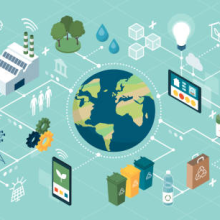How To Transform Your Business with Eco-Friendly Solutions
In today’s world, where environmental concerns are becoming increasingly important, businesses have a responsibility to adopt eco-friendly solutions. Not only does this contribute to a greener future, but it also offers numerous benefits for the business itself. This blog post will explore the importance of eco-friendly solutions, how businesses can embrace sustainability, and the various strategies and initiatives they can implement to become more environmentally conscious.

The Importance of Eco-Friendly Solutions
Eco-friendly solutions are vital for the well-being of our planet. With rising concerns about climate change, pollution, and depletion of natural resources, businesses need to take action to minimize their environmental impact. By implementing sustainable practices, businesses can reduce their carbon footprint, conserve energy and water, and promote a healthier ecosystem.
Embracing Eco-Friendly Solutions
In today’s world, an increasing number of individuals are recognizing the importance of sustainability. They are making conscious choices to support environmentally responsible brands. For businesses that have not yet embraced sustainable practices, it’s essential to take a step back and assess their impact on the environment. One of the most recommended steps towards sustainability is transitioning to renewable energy sources for powering the company.
If your current energy provider does not offer renewable energy options, it may be time to explore alternatives. Consider switching to a provider that can assure you that their energy comes exclusively from renewable sources. To truly make a difference, it’s crucial to think creatively and identify areas within your business where you can implement the principles of reduce, reuse, and recycle. This can extend to office supplies, operational processes, and packaging materials.
Therefore, adopting eco-friendly practices is not only a responsible choice but also a way to appeal to a growing eco-conscious consumer base. By taking these steps, your business can make a positive contribution to shaping a sustainable future.
Eco-friendly solutions For Business Practices
Implementing eco-friendly solutions is the same thing as sustainable business practices, which involves making conscious decisions that prioritize the long-term well-being of the planet. This can include reducing waste, recycling, using renewable energy sources, and implementing energy-efficient technologies. By adopting these practices, businesses can minimize their environmental impact and save costs in the long run.
Eco-Conscious Decision Making
Eco-conscious decision making involves considering the environmental impact of every business decision. This can include choosing suppliers and partners that share the same commitment to sustainability, opting for environmentally friendly packaging, and promoting responsible consumption among customers.
Leveraging Green Technology
Green technology refers to the use of environmentally friendly solutions to address various challenges faced by businesses. This can include using energy-efficient equipment, implementing smart systems to optimize resource consumption, and adopting renewable energy sources. By leveraging green technology, businesses can reduce their environmental impact while also improving efficiency and productivity.
Green Initiatives and Innovations
Businesses can also take part in green initiatives and innovations to further promote sustainability. This can involve partnering with environmental organizations, participating in community clean-up events, and supporting research and development of eco-friendly technologies. By actively engaging in these initiatives, businesses can contribute to a greener future and inspire others to do the same.
Eco-Friendly Technology Integration
Integrating eco-friendly technology into business operations is crucial for long-term sustainability. This can include using cloud-based solutions to reduce paper usage, implementing recycling programs, and adopting digital communication tools to minimize travel and transportation. By embracing these technologies, businesses can reduce their environmental impact and improve efficiency.
The Path to Environmental Sustainability
Achieving environmental sustainability requires a comprehensive and long-term approach. Businesses should set clear goals and targets for reducing their carbon footprint, conserving resources, and promoting eco-friendly practices. Regular monitoring and evaluation of progress are essential to ensure continuous improvement and identify areas for further action.
Strategies for Reducing Carbon Footprint
Reducing carbon footprint is a key component of eco-friendly business practices. Businesses can achieve this by optimizing energy consumption, promoting energy-efficient transportation, and investing in renewable energy sources. Additionally, implementing waste reduction and recycling programs can further contribute to carbon footprint reduction.
Sustainable Development Goals
The United Nations’ Sustainable Development Goals provide a framework for businesses to align their sustainability efforts. These goals address various global challenges, including climate action, responsible consumption and production, and affordable and clean energy. By aligning with these goals, businesses can contribute to a more sustainable future.
Eco-Friendly Products and Services
Developing eco-friendly products and services is crucial for meeting consumer demand for sustainability. Businesses should prioritize product innovation that minimizes environmental impact, uses sustainable materials, and promotes responsible consumption. By offering eco-conscious options, businesses can attract environmentally conscious consumers and differentiate themselves in the market.
Product Innovation for Sustainability
Product innovation plays a significant role in driving sustainability in businesses. This can involve developing products that are energy-efficient, recyclable, and made from sustainable materials. Additionally, businesses can explore opportunities for product redesign and lifecycle assessment to minimize environmental impact throughout the product’s lifespan.
Meeting Consumer Demand for Eco-Consciousness
Consumer demand for eco-consciousness is on the rise. Businesses that prioritize sustainability and offer environmentally friendly products and services are more likely to attract and retain customers. By understanding consumer preferences and values, businesses can tailor their offerings to meet these demands and gain a competitive edge.
Conclusion
Transforming your business with eco-friendly solutions is not only essential for the environment but also for the long-term success and reputation of your business. By embracing sustainability, implementing sustainable practices, and leveraging green technology, businesses can reduce their environmental impact, attract environmentally conscious customers, and contribute to a greener tomorrow. Start your journey towards a sustainable future today!


